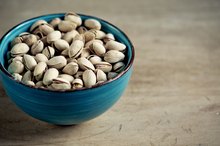What does fact checked mean?
At Healthfully, we strive to deliver objective content that is accurate and up-to-date. Our team periodically reviews articles in order to ensure content quality. The sources cited below consist of evidence from peer-reviewed journals, prominent medical organizations, academic associations, and government data.
The information contained on this site is for informational purposes only, and should not be used as a substitute for the advice of a professional health care provider. Please check with the appropriate physician regarding health questions and concerns. Although we strive to deliver accurate and up-to-date information, no guarantee to that effect is made.
Do Almonds Give You Energy?
All food provides some energy in the form of calories. However, some foods come packed with more energy than others. Nuts, including almonds, tend to have a relatively high number of calories per serving. That makes almonds a useful and healthy snack for delivering high energy in a small serving. Almonds also pack in other nutritional benefits such as high fiber content.
Calories
A calorie is a measure of the energy within a piece of food. Specifically, a single food calorie measures the energy required to increase the temperature of 1 kg of water by 1 degree Celsius. In terms of your body, this energy enables your muscles, organs and all other biological processes to function. The three main forms of fuel are carbohydrates, fats and, to a lesser extent, proteins.
- A calorie is a measure of the energy within a piece of food.
- Specifically, a single food calorie measures the energy required to increase the temperature of 1 kg of water by 1 degree Celsius.
Almonds
How Many Calories Are in Fruitcake?
Learn More
A cup of whole almonds contains 822 calories, according to the USDA National Nutrient Database 1. Almost half of those calories come from fat -- the most calorie-dense of all food substances. Under 22 percent comes from carbohydrates, with over half of that total from fiber and around one-seventh from sugars. Protein makes up 21 percent of an almond's nutritional content. However, protein offers less immediate energy benefits than fats and carbohydrates.
- A cup of whole almonds contains 822 calories, according to the USDA National Nutrient Database 1.
- Under 22 percent comes from carbohydrates, with over half of that total from fiber and around one-seventh from sugars.
Energy Levels
The "Harvard Heart Letter" lists a variety of activities and the energy you expend when doing them for 30 minutes 2. At the low end, for example, a 155-lb. person can expect to burn 149 calories doing yoga. At the other end of the scale, running at 10 miles per hour for 30 minutes burns 614 calories in a 155-lb 2. person. That means that 1 cup of almonds provides easily enough energy in theory for most half-hour activities.
Considerations
How Much Weight Can You Lose Playing Golf?
Learn More
You most likely won't eat a whole cup of almonds in one sitting. However, as a mid-afternoon snack or a way to keep your energy levels up through the day, small handfuls of almonds work well. The high fiber content of almonds may produce a laxative effect in your body, increasing the speed of your bowel movements. You may want to avoid eating too many at one time for that reason.
- You most likely won't eat a whole cup of almonds in one sitting.
Related Articles
References
- USDA National Nutrient Database
- "Harvard Heart Letter"; Calories Burned in 30 Minutes for People of Three Different Weights; July 2004
- Atkinson, FS, Foster-Powell, K, Brand-Miller, JC.International tables of glycemic index and glycemic load values: 2008.Diabetes Care. 2008;31(12):2281-2283. doi:10.2337/dc08-1239
- National Library of Medicine, National Institutes of Health. Dietary Reference Intakes (DRIs): Recommended dietary allowances and adequate intakes, elements.
- Aune D, Keum N, Giovannucci E, et al. Nut consumption and risk of cardiovascular disease, total cancer, all-cause an cause-specific mortality: A systematic review and dose-response meta-analysis of prospective studies. BMC Med. 2016;14(1):207. doi:10.1186/s12916-016-0730-3
- Alasalvar C, Bolling BW. Review of nut phytochemicals, fat-soluble bioactives, antioxidant components and health effects. Br J Nutr. 2015;113 Suppl 2:S68-78. doi:10.1017/S0007114514003729
- Veronese N, Watutantrige-Fernando S, Luchini C, et al. Effect of magnesium supplementation on glucose metabolism in people with or at risk of diabetes: A systematic review and meta-analysis of double-blind randomized controlled trials. Eur J Clin Nutr. 2016;70(12):1354-1359. doi:10.1038/ejcn.2016.154
- American College of Allergy, Asthma & Immunology. Oral Allergy Syndrome. Updated March 2019.
Writer Bio
Based near London, U.K., Peter Mitchell has been a journalist and copywriter for over eight years. Credits include stories for "The Guardian" and the BBC. Mitchell is an experienced player and coach for basketball and soccer teams, and has written articles on nutrition, health and fitness. He has a First Class Bachelor of Arts (Hons.) from Bristol University.









